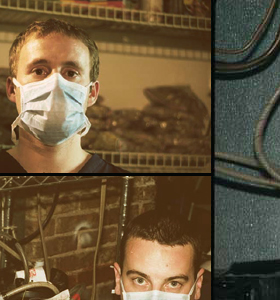Wednesday, February 18, 2026 |
||

CLINIC: What's Behind Those Surgical Masks? Taking the pulse of the cool British export Interview Yancey Strickler Photography Brendan Colthurst |
|

Carl Turney and Brian Campbell Carl Turney: "We're not trying to glorify violence or terrorism." |
Strickler: Will the new audience change the way you record music?
Turney: The people who are listening to it are into exactly the same things we were into, and that's why we did it in the first place, because we liked it. People who listen to the songs are going to keep with what's going on with the band. They'll probably be curious about how the band's going to sound next and want to be challenged by the next album. We want to challenge ourselves anyway, so it will be an ongoing process. Blackburn: When we actually did the singles and the album it wasn't typical of what was happening at that time. If there's anything that is constant about it, it's that it's not just repeating itself. Whatever we are doing next is bound to be different, but it's still going to have some kind of constancy to it. It's still got the same sort of twists and unusual instruments. You find if you do try and repeat a sound or stick to a formula, it's usually a dilution of what was good originally, and it gets progressively worse. Turney: The impact goes. When a band has a really good album, or you see a good painting and somebody else does something in that style, it's never as good as the impact of when you first saw or heard that actual thing for the first time, when it was in its purest form. When somebody tries to do something like it or recreate it, it's never got the same impact. Strickler: With rock writers and serious fans there's definitely a hierarchy that places people who did something first over people who did it best. Do you think there should be that much importance placed on the originator? Blackburn: Yeah, I'd say so. I'm sure there are exceptions, but doing music it's quite easy to take elements of the originator, what they've done, and add your own pieces to it. The true talent is to come up with something which people haven't heard before. That's where the imagination is. A pretty obvious example — take the Velvet Underground and then the Modern Lovers and Stooges, which is still really, really good. But you have to credit, within that line of bands, the Velvets as being the most worthy to listen to. Strickler: Now there is the concept of the new original. If a band comes up copying the Velvet Underground, the public would hear it and think it's something new. People aren't aware of what the past brought. Turney: Can you think of an example of that? Strickler: Well, potentially The Strokes. Turney: Good example. Strickler: They're not all Velvet Underground and Marc Bolan, but a lot of their music is. Turney: References that people of a younger age won't pick up until they delve into the music a bit more. Strickler: You need music like that to make people search for more. Blackburn: That's what ends up happening, because pop and rock have been going for 50 years or something. That's when it turns back on itself. Then you've got the argument, has it all been done? Can you only have different combinations of what's already existed? Turney: It's a generational thing. As it goes, people are getting into each generation of music and then discovering more when everyone tells them, "You might like it, but it's actually just like that." Blackburn: I'm sure in the '60s, with someone like the Velvets, someone's dad was saying to them, "It just sounds like distorted Howlin' Wolf." |